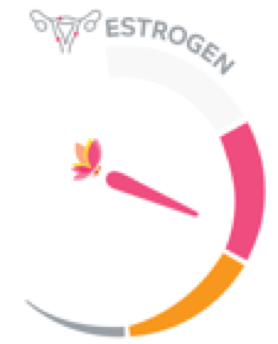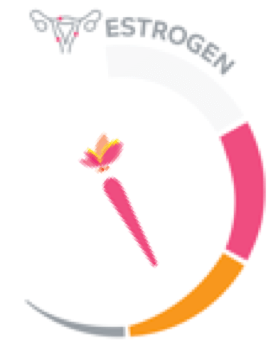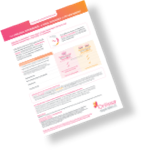150 mg QD
Recommended for
long-term use of up
to 24 months*

150 mg QD
Recommended for
long-term use of up
to 24 months*



200 mg BID
Recommended for
up to 6 months
Pills pictured are not actual size.
*For patients with moderate hepatic impairment (Child-Pugh Class B), initiate treatment with ORILISSA 150 mg QD for up to 6 months. Limit the duration of use because of bone loss. Use of ORILISSA 200 mg BID is not recommended.

Dosing Guide
Download a PDF of ORILISSA dosing and administration information
ORILISSA 150 mg QD
Take AM or PM
No more than 1 tablet a day
Dysmenorrhea
✓
Non-menstrual Pelvic Pain
✓
Dyspareunia
Pain relief not statistically significant in trials
Duration of use
24 months
ORILISSA 200 mg BID
Take AM and PM
No more than 2 tablets a day
Dysmenorrhea
✓
Non-menstrual Pelvic Pain
✓
Dyspareunia
✓
Duration of use
6 months
Dysmenorrhea
✓
✓
Non-menstrual Pelvic Pain
✓
✓
Dyspareunia
Pain relief not statistically significant in trials
✓
Duration of use
24 months
6 months
ORILISSA® (elagolix) is indicated for the management of moderate to severe pain associated with endometriosis.
These are not all the possible side effects of ORILISSA.
Safety and effectiveness of ORILISSA in patients less than 18 years of age have not been established.
US-ORIL-200330
For more information, please click here for full Prescribing Information.
1. ORILISSA [package insert]. North Chicago, IL: AbbVie Inc. 2. Taylor HS, Giudice LC, Lessey BA, et al. Treatment of endometriosis-associated pain with elagolix, an oral GnRH antagonist. N Engl J Med. 2017;377(1):28-40.
ORILISSA® (elagolix) is indicated for the management of moderate to severe pain associated with endometriosis. Limit the duration of use based on the dose and coexisting condition.
CONTRAINDICATIONS
Bone Loss
These are not all the possible side effects of ORILISSA.
Safety and effectiveness of ORILISSA in pediatric patients have not been established.
US-ORIL-210045
For more information, please click here for full Prescribing Information.
1. ORILISSA [package insert]. North Chicago, IL: AbbVie Inc. 2. Taylor HS, Giudice LC, Lessey BA, et al. Treatment of endometriosis-associated pain with elagolix, an oral GnRH antagonist. N Engl J Med. 2017;377(1):28-40.